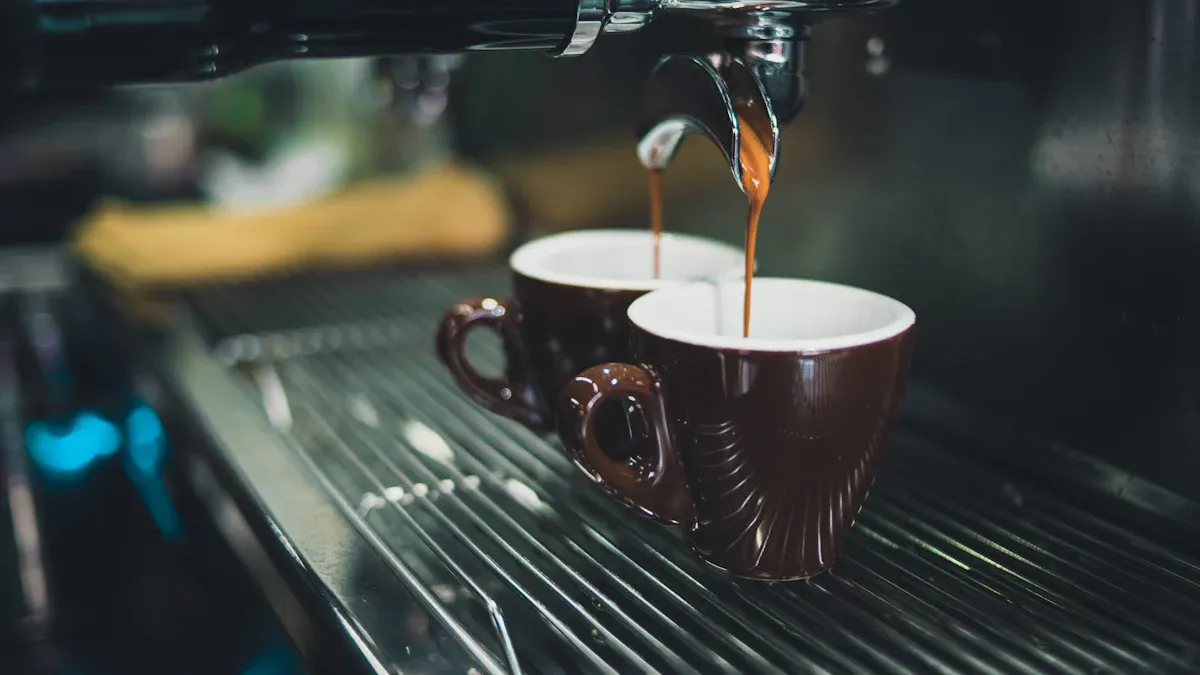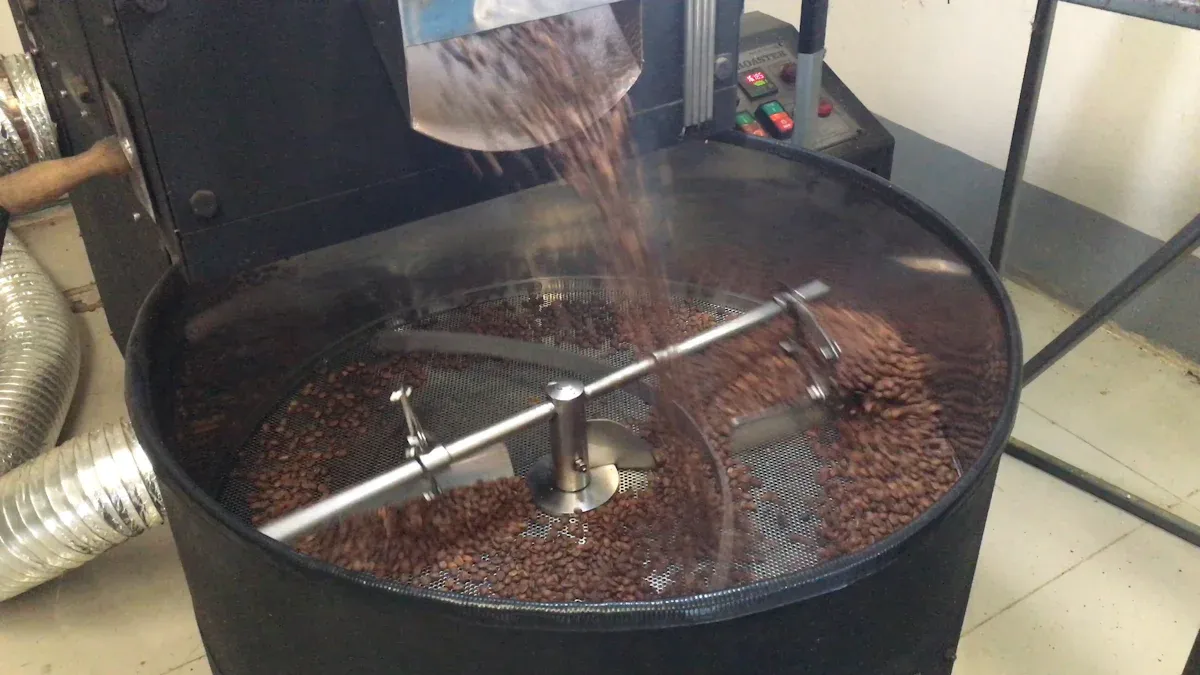
The global demand for automatic coffee machines continues to rise, driven by the need for convenience and advanced technology. In 2025, the top 5 countries importing automatic coffee machines are India, Russia, Turkey, the United States, and Germany. This trend highlights a growing preference for automated solutions in coffee preparation.
- The coffee machines market is projected to reach $20.59 billion globally by 2028, with a compound annual growth rate (CAGR) of 4.3%.
- Automatic coffee machine imports alone are expected to grow at a CAGR of 5.06% from 2021 to 2028.
This surge reflects shifting lifestyles and the increasing appeal of premium coffee experiences worldwide, particularly in the top 5 countries importing automatic coffee machines in 2025.
Key Takeaways
- The global market for automatic coffee machines may hit $20.59 billion by 2028. This growth is due to ease of use and new technology.
- India, Russia, Turkey, the U.S., and Germany will be the top 5 countries buying automatic coffee machines in 2025.
- People like these machines because they make great coffee easily.
- New technology, like smart features and custom settings, is changing how people make coffee.
- More money to spend and growing cities are increasing the need for better coffee at home.
Overview of Global Demand for Automatic Coffee Machines

Growing popularity of automatic coffee machines worldwide
The global market for automatic coffee machines has experienced remarkable growth in recent years. Consumers increasingly prefer these machines for their ability to deliver high-quality coffee with minimal effort. Home use accounts for approximately 75% of total sales, reflecting a strong inclination toward convenience in coffee preparation. Specialty coffee beverages, such as lattes and espressos, have also gained popularity, further boosting demand for advanced coffee-making solutions.
Technological advancements have played a pivotal role in this trend. Smart coffee makers equipped with features like app integration and voice control offer a tailored brewing experience. These innovations enhance user satisfaction and attract tech-savvy consumers. Additionally, the market for drip filter coffee machines is projected to grow to USD 2831.2 million by 2033, with a compound annual growth rate (CAGR) of 4.2% from 2023 to 2033. This growth underscores the increasing adoption of automated coffee solutions worldwide.
Key factors driving demand: convenience, technology, and lifestyle changes
Several factors contribute to the rising demand for automatic coffee machines. Convenience remains a primary driver, as these machines allow users to brew coffee quickly and effortlessly. Time-saving features appeal to busy individuals who value efficiency in their daily routines. The ability to maintain consistency in brewing parameters ensures a high-quality coffee experience, comparable to that of specialty coffee shops.
Technology also plays a significant role. Smart features, such as connectivity with home systems and customization options, cater to diverse consumer preferences. Lifestyle changes, including the growing coffee culture and the shift toward premium coffee experiences, further fuel demand. The fully automatic coffee machine market is expected to grow from $3.99 billion in 2024 to $4.21 billion in 2025, with a CAGR of 5.7%. This growth highlights the increasing importance of technology and convenience in shaping consumer choices.
The global demand for automatic coffee machines reflects a broader shift toward technology-driven solutions that prioritize convenience and quality. As these trends continue, the market is poised for sustained growth.
Analysis of Each Top Importing Country
India: Rapid urbanization and increasing middle-class population driving demand
India’s growing urbanization and expanding middle-class population are key factors driving the demand for automatic coffee machines. Urban areas are witnessing a shift in consumer lifestyles, with a preference for convenience and premium coffee experiences. The influence of Western coffee culture has also contributed to the rising popularity of specialty coffee drinks, such as cappuccinos and espressos.
Rising disposable incomes among urban consumers have further fueled this trend. Many households now view automatic coffee machines as an essential appliance rather than a luxury. According to urbanization statistics, the demand for convenience in coffee brewing has grown significantly in metropolitan cities like Mumbai, Delhi, and Bangalore. This shift aligns with India’s broader economic growth and changing consumer preferences.
| Evidence Type | Description |
|---|---|
| Urbanization Impact | Urbanization in India is leading to a shift in consumer lifestyles, increasing the demand for convenience in coffee brewing. |
| Cultural Influence | The influence of Western coffee culture is driving the appreciation for specialty coffee drinks. |
| Economic Factors | Rising disposable incomes among urban consumers are contributing to the demand for premium coffee machines. |
Russia: Rising coffee culture and preference for premium coffee experiences
Russia’s coffee culture has evolved significantly in recent years, with a growing preference for premium coffee experiences. Urban areas, particularly Moscow and St. Petersburg, have seen a surge in specialty coffee shops. This trend reflects a shift from traditional instant coffee to premium whole bean and ground coffee products. Consumers increasingly value the quality and taste of their coffee, which has led to a rise in demand for automatic coffee machines.
Several factors contribute to this shift. Rising disposable incomes and Western cultural influences have played a significant role, especially in major cities. The Eastern European coffee market, including Russia, is rapidly evolving, with consumers seeking high-quality coffee solutions at home. Automatic coffee machines cater to this demand by offering convenience and consistency.
- Key trends in Russia’s coffee market:
- Transition from instant coffee to premium whole bean and ground coffee.
- Growth of specialty coffee shops in urban areas.
- Increased influence of Western coffee culture on consumer preferences.
Turkey: Strong coffee tradition and growing interest in automated solutions
Turkey’s rich coffee tradition dates back to the Ottoman Empire, making coffee an integral part of its culture. Turkish coffee, known for its unique preparation method and strong flavor, has been a symbol of hospitality and social gatherings for centuries. However, modern consumers in Turkey are increasingly exploring automated coffee solutions that combine tradition with convenience.
The growing interest in automatic coffee machines reflects a shift in consumer behavior. While traditional Turkish coffee remains popular, younger generations are embracing specialty coffee drinks and automated brewing methods. This trend is particularly evident in urban areas like Istanbul, where coffee culture continues to thrive.
| Historical Milestone | Description |
|---|---|
| Origin of Turkish Coffee | First used by the Ottomans in the early 1500s. |
| First Coffeehouse | Opened in Tahtakale, Istanbul in 1555. |
| Cultural Heritage | Registered in the intangible cultural heritage inventory since 2013. |
| Social Role | Symbolizes hospitality and is integral to social occasions. |
The combination of a strong coffee tradition and a growing interest in automated solutions positions Turkey as one of the top 5 countries importing automatic coffee machines in 2025.
United States: Large market size and high consumer spending on coffee products
The United States stands out as a significant importer of automatic coffee machines due to its vast market size and high consumer spending on coffee-related products. The coffee industry in the U.S. has experienced remarkable growth, with an economic impact of $343.2 billion in 2022, marking a 52.4% increase since 2015. Consumer spending accounted for $110 billion of this total, highlighting the strong demand for coffee products. The industry also supports 2.2 million jobs and generates $100 billion in wages, further emphasizing its economic importance.
Several factors contribute to the growing market potential for automatic coffee machines in the U.S. Home coffee consumption has risen from 80% pre-pandemic to 84% post-pandemic, reflecting a shift in consumer behavior. Specialty coffee has gained popularity, with 43% of coffee drinkers choosing specialty options daily, a 20% increase since January 2021. Additionally, nearly 70% of consumers prefer purchasing home appliances, including coffee makers, online. These trends indicate a strong preference for convenience and premium coffee experiences, driving the demand for advanced coffee machines.
The U.S. coffee market is projected to grow from $27.95 billion in 2024 to $38.76 billion by 2033, with a compound annual growth rate (CAGR) of 3.70% from 2025 to 2033. This growth is fueled by increasing consumer interest in specialty and organic coffee, as well as the expanding café culture. Automatic coffee machines cater to these preferences by offering high-quality, customizable brewing options that align with the evolving tastes of American consumers.
The United States’ large market size, coupled with its high consumer spending on coffee products, positions it as a key player among the top 5 countries importing automatic coffee machines in 2025.
Germany: Advanced technology adoption and strong coffee consumption culture
Germany’s reputation as a leader in technological innovation and its deep-rooted coffee culture make it a prominent importer of automatic coffee machines. The country commands approximately 21% of the European coffee machine market in 2024, solidifying its status as the largest market in the region. By 2034, Germany is projected to hold a 25.3% share of the Western European coffee machine market, reflecting its strong consumer base and preference for advanced coffee-making solutions.
The integration of smart technology in coffee machines has driven their popularity among tech-savvy German consumers. Features such as app connectivity, voice control, and customizable brewing settings align with the country’s high adoption rates of innovative technologies. The fully automatic coffee machine segment, in particular, has seen significant growth, as consumers prioritize convenience and quality in their coffee experiences.
Germany’s coffee consumption culture further supports its position as a top importer. In 2025, the coffee machines market in Germany is expected to generate approximately $1.16 billion in revenue, with an annual growth rate of 2.33% from 2025 to 2030. Per household revenue in this market is estimated at $27.68, showcasing the significant investment German consumers make in coffee-related products. The anticipated volume of coffee machines is projected to reach 6.80 million pieces by 2030, underscoring the strong demand for coffee machines in the country.
Germany’s advanced technology adoption and robust coffee consumption culture firmly establish it as one of the top 5 countries importing automatic coffee machines in 2025.
Key Trends Influencing Imports in 2025

Technological advancements in coffee machines
Technological innovation continues to redefine the automatic coffee machine market. Manufacturers are integrating smart features such as smartphone connectivity and voice control, enabling users to schedule brews or customize settings remotely. Bosch introduced a new line of smart built-in coffee machines in January 2023, featuring enhanced bean grinding technology. Similarly, Whirlpool launched a model with advanced milk frothing capabilities in July 2023, catering to specialty coffee enthusiasts.
The shift toward premiumization is evident, with consumers seeking precise temperature control and adjustable grind sizes. Smart home integration has also gained traction, allowing seamless operation through mobile applications. Additionally, sustainability remains a priority. Many manufacturers now incorporate eco-friendly materials and energy-efficient features, aligning with the preferences of environmentally conscious buyers.
Shifts in consumer behavior and preferences
Consumer behavior is evolving, with a growing emphasis on convenience and customization. Fully automatic coffee machines are becoming increasingly popular due to their user-friendly interfaces and ability to deliver consistent, high-quality coffee. A study conducted in October 2023 highlighted a rising preference for these machines, particularly among younger demographics.
Specialty coffee enthusiasts are driving demand for machines that offer precise control over brewing parameters. Features like intuitive touchscreens and simplified controls make these machines accessible to a broader audience. The luxury segment is also expanding, with high-end brands offering sophisticated designs and advanced functionalities. This trend reflects a broader cultural shift toward premium coffee experiences at home.
Economic and trade factors affecting global imports
Economic and trade dynamics significantly influence the import of automatic coffee machines. Countries like India and Turkey, part of the “Top 5 Countries Importing Automatic Coffee Machines in 2025,” are experiencing rapid urbanization and rising disposable incomes. These factors contribute to increased consumer spending on premium appliances.
Trade policies and tariffs also play a crucial role. Favorable trade agreements between exporting and importing nations facilitate the flow of goods, while economic stability in key markets supports sustained demand. Additionally, the global focus on sustainability has prompted governments to incentivize the adoption of energy-efficient appliances, further boosting imports.
| Key Trend | Description |
|---|---|
| Integration of Smart Technology | Fully automatic coffee machines are incorporating smart features such as smartphone connectivity and voice control. |
| Sustainable and Eco-friendly Solutions | Manufacturers are focusing on energy-saving features and recyclable materials to cater to environmentally conscious consumers. |
| Specialty Coffee Emphasis | There is a rising emphasis on catering to specialty coffee enthusiasts with machines that allow precise control over extraction parameters. |
| User-Friendly Interfaces | Investment in intuitive touchscreens and simplified controls makes machines more accessible to a wider range of users. |
| Increased Customization Options | More customization options are being offered, allowing users to adjust strength, volume, temperature, and coffee varieties. |
The interplay of technology, consumer preferences, and economic factors underscores the dynamic nature of the global coffee machine market. These trends will continue to shape the landscape of imports in 2025.
India, Russia, Turkey, the United States, and Germany stand out as the top 5 countries importing automatic coffee machines in 2025. Each country demonstrates unique factors driving demand, from urbanization and cultural shifts to advanced technology adoption. Convenience, technological innovation, and evolving consumer preferences remain the primary forces shaping this trend.
The global coffee machine market is projected to reach $15.1 billion by 2029, with a compound annual growth rate (CAGR) of 3.5% from 2024 to 2029. This growth reflects advancements in smart home technologies and a rising focus on sustainability. Emerging markets, particularly in Asia-Pacific, are expected to play a significant role in expanding the market. These developments suggest a promising future for the industry, with innovations continuing to redefine coffee experiences worldwide.
FAQ
What are automatic coffee machines, and how do they work?
Automatic coffee machines brew coffee with minimal user intervention. They grind beans, heat water, and extract coffee at the press of a button. Advanced models offer features like milk frothing and customizable settings, providing a café-like experience at home or in the office.
Why are automatic coffee machines gaining popularity?
Consumers value convenience and quality. These machines save time and deliver consistent results. Features like app integration, voice control, and customization cater to modern lifestyles. The growing coffee culture and demand for premium experiences further boost their appeal.
Which features should buyers consider when purchasing an automatic coffee machine?
Key features include bean grinding options, brewing temperature control, milk frothing capabilities, and smart connectivity. Buyers should also consider machine size, ease of cleaning, and energy efficiency. Advanced models often provide customizable settings for a tailored coffee experience.
Are automatic coffee machines environmentally friendly?
Many manufacturers now prioritize sustainability. Machines with energy-saving modes and recyclable materials reduce environmental impact. Buyers can also choose models compatible with reusable filters or biodegradable coffee pods to minimize waste.
How do trade policies affect the import of automatic coffee machines?
Trade policies influence pricing and availability. Favorable agreements between exporting and importing countries reduce tariffs, making machines more affordable. Economic stability and government incentives for energy-efficient appliances also encourage imports and drive market growth.
Post time: Apr-15-2025
